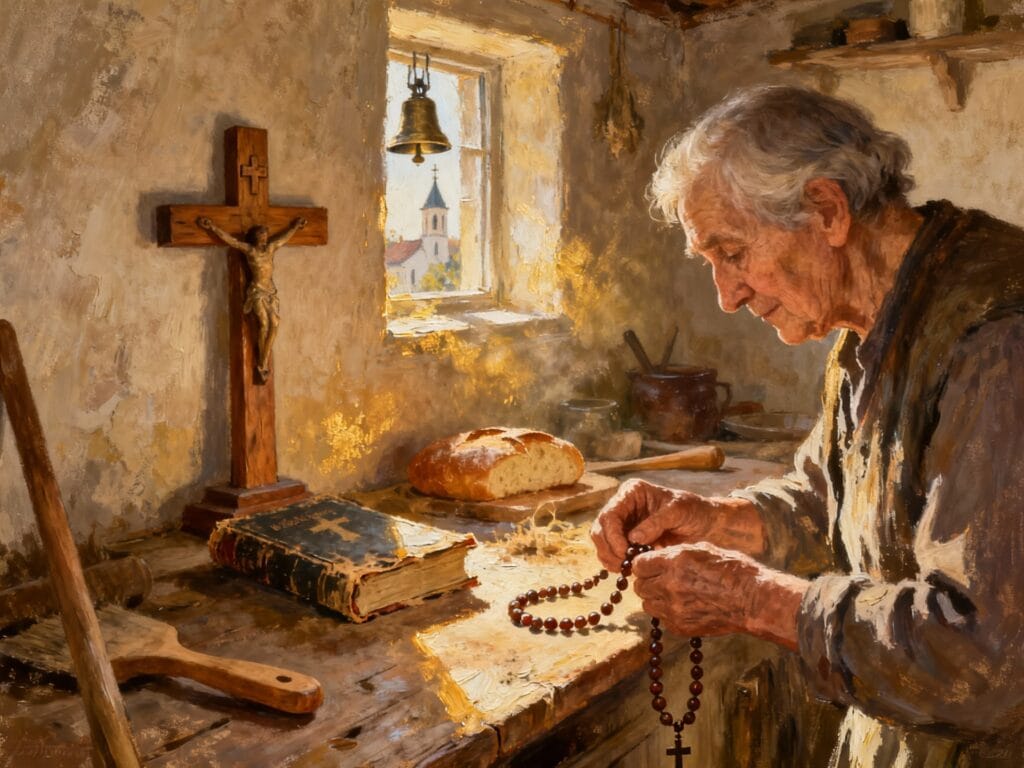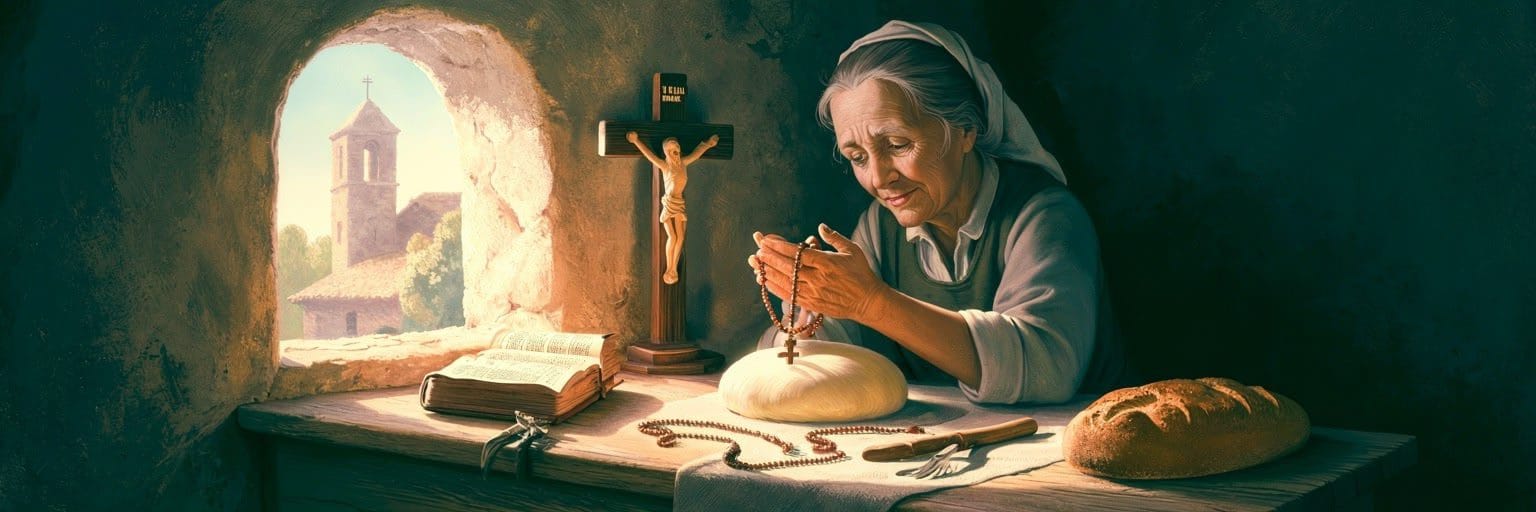Your ancestors possessed a secret we've lost in the whirlwind of modernity. They didn't consult meditation apps or set alarms for their spiritual moments, yet their prayer had a depth and regularity that eludes us today. What they understood instinctively, we must consciously relearn.
In our age of instantaneity and constant distractions, prayer has become a fragmented act, sandwiched between notifications and daily emergencies. We pray while driving, between meetings, or late at night when exhaustion catches up with us. This fragmented approach contrasts dramatically with the natural fluidity with which our predecessors integrated traditional prayer into the very fabric of their lives.
The difference lies not in their supposedly superior piety, but in their intuitive understanding of what truly nourishes the soul. They had discovered universal principles of ancient spirituality that we can rediscover and adapt to our times.
The Lost Rhythm: When Prayer Structured Time
Imagine a time when bells naturally punctuated the day, not as a constraint, but as an invitation to refocus. Our ancestors lived by a spiritual rhythm that transformed ordinary time into a mobile sanctuary. Their secret lay in this fundamental understanding: regularity creates depth.
Unlike our modern approach, which favors sporadic intensity, they relied on gentle consistency. Their daily prayer sessions weren't spiritual marathons, but rather regular breaths that oxygenated their souls throughout the day. This approach recognized a profound truth about human nature: we are creatures of habit, and our habits shape who we become.
The beauty of this system lay in its simplicity. No extraordinary motivations or particular states of mind were required. The framework was established, the structure supported the individual, even in moments of spiritual drought. Traditional prayer did not depend on the mood of the moment, but gradually created the mood of the soul..
This regularity allowed for something our time struggles to comprehend: spiritual maturation through accumulation. Each prayer built on the previous one, creating a sedimentation of spiritual experience that gradually enriched the relationship with the divine. Our ancestors understood that spirituality, like any art, develops through repeated practice rather than spontaneous impulses.

The Wisdom of Repetition: Why They Recited Without Getting Tired
Our modern era often perceives repetition as the enemy of authenticity. We seek novelty, creativity, and originality in our spiritual expressions. Yet our ancestors discovered in repetition a powerful vehicle to the depths of spiritual experience.
Consider the Catholic rosary, a practice that may seem repetitive to the modern eye. For our predecessors, this repetition was not a limitation but a liberation. By entrusting the structure to memory and familiar gestures, the mind was free to immerse itself in contemplation. Repetition became the vehicle that carried the soul beyond the usual mental chatter.
This wisdom recognized a fundamental psychological truth: our minds need anchors to access deeper states. Just as a virtuoso musician transcends scales through their perfect mastery, the practitioner of traditional prayer used the familiarity of words and gestures to access more subtle spiritual dimensions.
Repetition also created a remarkable phenomenon: progressive deepening. The same words, recited consistently, revealed unsuspected layers of meaning. A prayer recited a thousand times was not the same as the first time. It was enriched by lived experience, by the joys and sorrows endured, becoming an increasingly faithful mirror of the relationship with the divine.
The Art of the Sacred Everyday: Transforming the Ordinary
Our ancestors possessed a talent we secretly envy: the ability to transform the simplest gestures into sacred acts. They did not artificially separate the spiritual from the everyday, but found in their ordinary activities as many opportunities for Christian meditation.
This natural integration revealed a mature understanding of spirituality. For them, praying did not mean escaping from the world, but inhabiting it differentlyManual work became prayer, childcare became divine service, even meals were framed by moments of gratitude and blessing.
This holistic approach created a spiritual continuity that our compartmentalized era struggles to recapture. We tend to relegate spirituality to specific niches—Sunday mornings, a few minutes of meditation, occasional retreats. Our predecessors, on the other hand, wove prayer into the very fabric of their lives.
They intuitively understood that ancient spirituality was not nourished by exceptional experiences but by the sanctification of the banalThis wisdom allowed them to find God in the dough they kneaded, in the wood they cut, in everyday conversations. Each activity carried within it the seed of a spiritual encounter.
This integration created a remarkable ripple effect: the more they practiced this spiritual presence in small things, the more natural and spontaneous it became. Their entire existence was gradually colored by a contemplative dimension that transformed their relationship to the world and to others.

The Simple Tools of Deep Prayer
Unlike our era, which multiplies the supports and methods, our ancestors relied on a few simple but proven tools. They had understood that in matters of spiritual practices, Simplicity is often more powerful than sophistication.
Rosary beads, prayer books worn by faithful hands, holy pictures slipped into pockets—these objects served as tangible anchors in the invisible. They created a comforting familiarity that allowed the soul to settle quickly, without having to reinvent the conditions of the spiritual encounter each time.
This approach revealed a remarkable practical wisdom: our senses need to be engaged in spiritual experience. The touch of rosary beads, the scent of incense, the beauty of a sacred image—all these sensory elements served as gateways to interiority. Our ancestors prayed with their bodies as much as with their minds..
They also understood the importance of dedicated space. Even in the most modest homes, a corner was set aside for prayer, simply but carefully decorated. This physical space created a mental space, signaling to the soul that it was entering a special territory, conducive to meditation.
The beauty of these tools lay in their accessibility. No deep theological knowledge or exceptional spiritual dispositions were required. These simple supports made prayer practicable for everyone, in all circumstances of life.
Time Regained: Towards a Patient Spirituality
One of the best-kept secrets of our ancestors was their relationship with spiritual time. They did not seek effectiveness in prayer, but depth. They knew that some realities are only revealed to those who are willing to take the time.
This spiritual patience contrasts sharply with our instantaneous age. We want quick results, intense experiences, spectacular transformations. Our predecessors cultivated fruitful slowness, knowing that the soul has its own rhythms of maturation.
Imagine the difference between someone who wants to "meditate" for fifteen minutes a day and someone who lets daily prayer gradually permeate their way of being in the world. The former seeks benefit, the latter accepts transformation. This distinction reveals the very essence of the traditional approach: prayer was not a tool but a way of life.
This patience allowed spiritual fruits to ripen naturally. Instead of forcing mystical experiences or seeking immediate consolations, they created the conditions for spiritual growth and allowed time to take its course. This approach humbly recognized that we are not the masters of our own spiritual growth.

How to regain this lost wisdom
The good news is that these ancient secrets are not lost forever. They are simply waiting for us to rediscover them and adapt them to our times. The first step is to abandon the illusion that the more complicated it is, the more effective it is..
Start by choosing fixed times in your day—perhaps upon waking and before bed—to establish spiritual anchors. These times don't need to be long, but they should be regular. The consistency of a five-minute prayer is better than the sporadic intensity of an hour of weekly meditation.
Rediscover the beauty of repetition by choosing a few simple prayers to recite regularly. Give them time to take root in your memory and your heart. You'll find that these familiar words will become faithful companions in all moments of your life.
Create a dedicated space for prayer in your home, however modest. This physical space will signal to your soul that it is entering sacred territory. Surround yourself with simple objects that uplift your spirit: a cross, a picture, a prayer book worn by love.
Practice turning daily activities into opportunities for prayer. Rediscover the art of spiritual presence in the ordinaryYour journeys, your household chores, your moments of waiting can become so many invitations to contemplation.
The living heritage of the Catholic tradition
The Catholic tradition has jealously preserved these ancestral wisdoms. Through its centuries-old practices, it offers a treasure trove of spiritual experience that we can draw upon without moderation. The rosary, the liturgical hours, the cycles of feasts—all these elements form a coherent spiritual ecosystem that has proven its worth.
This tradition does not impose a straitjacket on us, but offers us a proven framework. It saves us from having to reinvent everything and allows us to draw on the experience of millions of souls who have gone before us.In a world that is changing at breakneck speed, these stable benchmarks become precious.
The beauty of this heritage lies in its ability to adapt to circumstances while preserving the essential. Our ancestors prayed in fields and workshops; we can pray in offices and on public transport. The forms evolve, but the spirit remains.
This tradition also teaches us spiritual humility. It reminds us that we are not the first to seek God, that others before us have traced paths that we can follow with confidence. We don't have to reinvent spirituality, but to receive it and live it..

Beyond Nostalgia: A Spirituality for Today
Rediscovering the spiritual secrets of our ancestors does not mean turning back the clock to an idealized past. Rather, it is about recovering universal wisdom that transcends time and can enrich our contemporary experience of faith.
Our ancestors were no holier than we are, but they benefited from an environment that naturally fostered certain spiritual attitudes. It is up to us to consciously recreate these favorable conditions in our modern context. We can be the spiritually wise ancestors of future generations.
This rediscovery invites us to question certain assumptions of our time. Are we sure that novelty is always preferable to tried and tested tradition? That spiritual individualism is more enriching than community anchoring? That complexity is more profound than simplicity?
By rediscovering these ancestral practices, we are not fleeing modernity, but rather enriching it. We are bringing to our troubled times the treasures of stability and depth that they so desperately need. We are becoming the guardians of a wisdom that was in danger of being lost.

Your Next Spiritual Breath
The time has come to move from understanding to action. The secrets of your ancestors are waiting to be revived through your own spiritual experience. Ancient wisdom awaits your decision to come back to life.
Start today with a simple gesture: choose a fixed time for daily prayer and stick to it for a week. Observe how this regularity, however modest, begins to color your relationship with time and with yourself differently.
Then gradually enrich this practice by adding the elements we have explored: fruitful repetition, the use of devotional objects, the sanctification of daily gestures. Let these habits take root slowly, in the manner of your ancestors who knew that the best things are not rushed.
You will then discover that traditional prayer is not an exercise of the past but a living resource for today. It will connect you not only to the divine, but also to that great communion of saints who, throughout the centuries, have nourished their souls from the same sources that are now available to you.
Your ancestors left you more than just a heritage: they passed on a spiritual way of life. Now it's up to you to make this legacy bear fruit and pass it on in turn.



